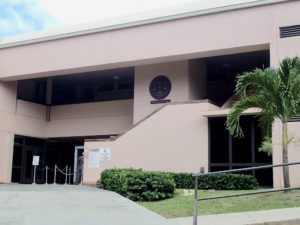
In a four-year-old case, the West Indian Company, Ltd. was ordered last week to adhere to the public records law of the Virgin Islands by Superior Court Judge Robert A Molloy.
“Because WICO falls under the executive branch of the Government of the Virgin Islands, all records or documents belonging to WICO also fall within the definition of ‘public records’ under the Virgin Islands Public Records Act. Thus, the inescapable conclusion is that all records and documents of or belonging to WICO, ‘a public entity operating on behalf of the Government,’ Act No. 5826, 8 (b) are subject to disclosure under the Virgin Islands Public Records Act,” Molloy’s opinion stated.
Back in 1912, WICO was founded – before the territory had been purchased from Denmark by the United States. It began as a coal bunkering business and grew to serve as port agent for the cruise lines that visited Charlotte Amalie. The GVI purchased 100 percent of WICO shares in 1993. The V.I. Legislature approved the stock purchase agreement and the government transferred all of WICO’s shares to the VI Public Finance Authority.
The case germinated as a result of a Legislative hearing in July 2015, during which WICO maintained it was prohibited from providing information on a controversial decision to pay Gov. Kenneth Mapp’s $12,000 a month rent for a villa on St. Thomas. Mapp’s permanent residence was on St. Croix, but he needed a residence on St. Thomas. The traditional Government House residence – Catharineberg – had not been usable for several years because of mold. Catharineberg is owned by WICO, which normally charged $1 annual rent.
After the Senate hearing, the Source, the St. Croix Avis and other media outlets submitted written requests to WICO to obtain the documents pertaining to the lease for governor’s villa. WICO declined and the Avis filed a petition for release of the documents with the court in July 2015.
WICO filed a motion to dismiss, again stating it was not a government agency, but provided the Avis with the documents it had requested including copies of the lease and transcripts of board meetings. According to the court, the “transcripts were significantly redacted.”
The judge then ordered sealed and un-redacted documents to be turned over to the Avis. This was not done and the Avis filed for sanctions. The court then took motions under advisement and, citing cases from the U.S. Court of Appeals for the Third Circuit and the Supreme Court of the Virgin Islands, ruled that WICO is a public agency. WICO then informed the court and the Avis it had decided to make records available to the public.
Since then WICO and the Avis have argued whether providing some of the documents would make the matter moot. If all documents had been turned over, un-redacted, WICO would have rendered the petition moot, Molloy stated, because all documents were provided. However, all of the documents were not disclosed.
The Avis then requested a writ of mandamus from the judge to order WICO to comply fully and WICO continued to seek a dismissal.
In the end, the court denied the Avis motion for sanctions and in favor of WICO’s motion to strike the Avis motion for sanctions.
When Gov. Albert Bryan Jr. took office in January, he directed WICO to follow the public records law – Bryan is also the board chair of the PFA.
In March, WICO held its first public meeting in years and voted to provide Bryan with a $3,500 a month apartment when he stays on St. Thomas.
To date, the Source has received none of the documents it requested in 2015.





